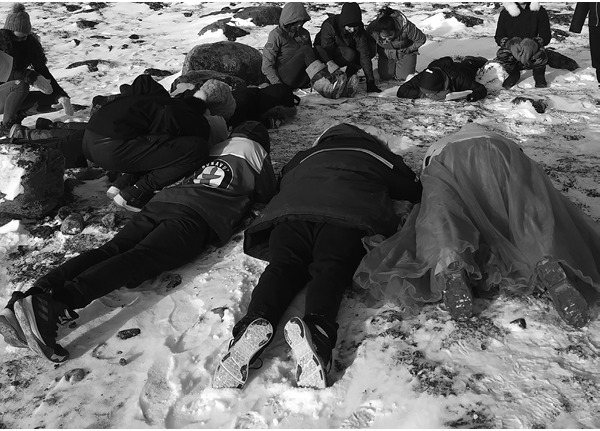
INSTRUCTIONS FOR BEING SNOW AND ICE
first performed on October 31, 2018
Road to Nowhere, on the Arctic tundra, Iqaluit, Canada
performed once in 2018
DEVORA NEUMARK
Iqaluit, Canada
076174661d076174661e076174661v076174661o076174661r076174661a076174661n076174661e076174661u076174661m076174661a076174661r076174661k076174661@076174661g076174661m076174661a076174661i076174661l076174661.076174661c076174661o076174661m
devoraneumark.com
INSTRUCTIONS FOR BEING SNOW AND ICE
DEVORA NEUMARK
Having moved to Nunavut in September 2018, I found myself somatically and emotionally experiencing what I had known intellectually for some time: climate change was impacting, first and foremost, the Arctic regions of the planet.1
Following the performance series that I co-created with JuPong Lin in 2017, titled “Instructions for Being Water: A Performance Score”2 that took up the issue of climate change and environmental justice in Vermont and Washington State, I initiated a new live art event in my new home, Iqaluit.
The new performance—“Instructions for Being Snow and Ice”—was carried out with the participation of (mostly Inuit) students from the local high school following preparatory sessions during which we discussed how performance art matters in addressing climate change. The score took shape during these sessions as the students spoke of their first-hand knowledge and family traditions.
Once gathered, we focused on the lighting of the qulliq (traditional Inuit oil lamp) while giving thanks to the ecosystem that sustained life in the north for millennia. The event continued with explorations of/in the snow, poetry recitation, throat singing, the sharing of freshly cooked caribou stew and tea. Observations about climate change gathered from local Iqaluit elders were read out loud.
Participants unanimously and enthusiastically responded yes when asked if they wanted to follow up this performance with new land-based, climate-related events. Post-performance observations included:
“I learned to relax and pay attention to what’s near me.”
“I learned that if we’re going on the land [we have to] be prepared for any weather.”
“Throat singing and deeply appreciating my land helped me connect with myself.”
Specifically on the subject of climate change, participants wrote:
“I learned different ways that climate change affects the land, from the elders’ perspectives.”
“I will try and be more aware of what’s going on with the land.”
“Yesterday I learned that the kamiks [traditional Inuit footwear] I was wearing were not warm and they hurt my feet. I also realized that our land is so beautiful, and you can visibly see climate change with the lack of snow.”
1 See for example, “An Integrated Regional Impact Study of Climate Change and Modernization: From Science to Policy in the Eastern Canadian Arctic,” ArcticNet, Quebec. 2018
2 See Emergency Index Vol. 7, Ugly Duckling Presse, New York. 2019